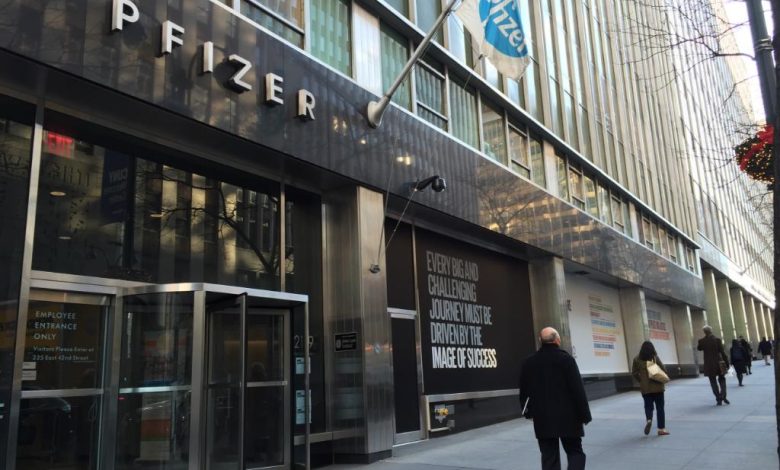Pfizer Faces Investor Backlash as 2024 COVID Sales Projection Plummets, Shares Hit a Decade Low

In a surprising turn of events, Pfizer, one of the leading pharmaceutical giants, has sent shockwaves through the market as it announced a grim projection for its 2024 sales. The company forecasts a potential shortfall of up to $5 billion compared to Wall Street expectations, leading to a drastic drop in share value to a 10-year low. The news comes as a blow to investors who have witnessed Pfizer’s stock decline by 44% over the course of the year.
The core of this setback lies in the revised outlook for revenue from Pfizer’s COVID-19 vaccine and treatment. Initially reaching a peak of $57 billion in 2022, these earnings are now anticipated to dwindle to $8 billion in 2024. This figure represents a significant dip from the already conservative estimate of $13 billion put forth by analysts and Pfizer’s own reduced projection of $12.5 billion for the ongoing year.
During a conference call with investors, Pfizer CEO Albert Bourla defended the conservative approach, stating, “We want to be reliable, so we won’t create uncertainty (again), which was the case, unfortunately, this year.” The company has been cautious in its forecasts, reflecting the unpredictability and challenges in the evolving landscape of the COVID-19 pandemic.
Pfizer’s strategy post the COVID-19 windfall involved acquisitions, notably the impending $43 billion deal for cancer drugmaker Seagen, scheduled to conclude this week. Despite these strategic moves, the recent launch of a respiratory syncytial virus (RSV) vaccine, based on the mRNA technology underpinning its successful COVID vaccine, has fallen short of expectations, contributing to the decline in share prices.
Compounding Pfizer’s challenges is the sharp decline in COVID vaccinations in the U.S., with only about 17% of the eligible population opting for the latest booster shots. Factors such as diminishing concerns about the virus and vaccine fatigue have played a role in this decline.
Furthermore, Pfizer’s adjusted profit forecast for 2024, ranging from $2.05 to $2.25 per share, fell short of analysts’ expectations of $3.16. This news triggered another 7.3% drop in Pfizer shares, potentially wiping out over $12 billion in market capitalization if the downward trend continues.
Notably, Pfizer’s vaccine rivals also experienced a dip in their share values, with Moderna down nearly 5% and BioNTech, Pfizer’s German vaccine partner, down 5.5%.
Jeff Jonas, portfolio manager for Gabelli Funds, expressed concerns about Pfizer’s financial strategies, stating that the company has accrued significant debt through deals like the Seagen acquisition. He remains skeptical about whether Pfizer has done enough to counterbalance the lost revenue from drugs expected to face generic competition in the coming years. Jonas emphasized the need for bolder moves to revitalize research and development within the company.
Seagen, anticipated to contribute $3.1 billion to Pfizer’s revenue next year, is seen as a potential bright spot amid the gloomy projections. However, some analysts, including Chris Schott from J.P. Morgan, suggest that the lowered forecasts may represent a baseline for 2024 sales.
This revelation comes just a day after Pfizer’s announcement of a reorganization in its cancer division to incorporate the Seagen acquisition. The company has also increased its cost-cutting target by $500 million.
The decline in COVID-related product sales has prompted Pfizer to initiate a job and expense reduction program, expected to save at least $4 billion annually by the end of 2024. On Tuesday, Pfizer announced the departure of Chief Commercial Officer Angela Hwang and outlined plans to reorganize its commercial business into two divisions, one focused on the United States and the other on the rest of the world.
Analyzing the situation, Citi analyst Andrew Baum observed that Pfizer’s management is reacting urgently to address its weak stock performance. However, the lack of promising high-potential pipeline assets poses a challenge for the company, particularly with several Pfizer products expected to go off patent in the next few years.
As Pfizer grapples with these challenges, its investors anxiously await signs of a robust strategy that can steer the company through the turbulent times ahead. The pharmaceutical giant finds itself at a crossroads, requiring bold and innovative solutions to regain market confidence and ensure sustainable growth. SEE: Can I Eat Chicken After Taking COVID Vaccine?





